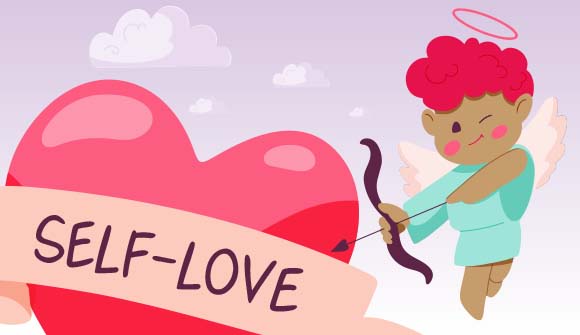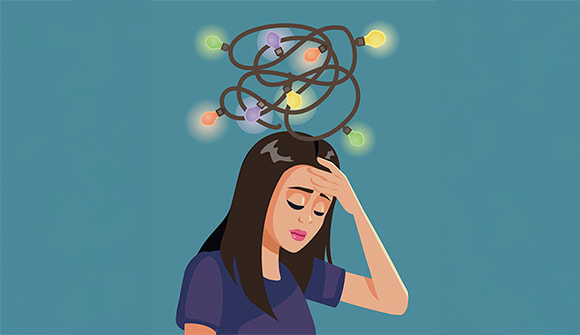Ways to manage anxiety
10 tips to improve your mental health and well-being.
Article Date:

Everyone experiences anxiety from time to time. High-profile celebrities, like actress and singer, Selena Gomez, talk openly about their struggles. Gomez is using her platform to let others know they're not alone in their anxious thoughts and behaviors.
Maybe you feel nervous about making that presentation at work. Or you worry about your child if he's late coming home from school. You're wringing your hands about how you're going to come up with the money for that major car repair.
A little anxiety can be beneficial. It'll push you to do the things you need to do, such as completing work tasks. But excessive fretting and worrying can be bad for your health.
"Too much anxiety can impact our ability to concentrate, function and remember things," said De'Von Patterson, PhD, a psychologist with Baptist Behavioral Health.
How to manage anxiety
Dr. Patterson and Cortney D. Surrency, ACE-CHC, a wellness coach and registered mental health counselor with Baptist Wellness Center at Riverside, offer these tips to help you manage your anxiety.
1. Do it anyway.
Anxiety can make us avoid social interactions, family events or work. "Unfortunately, avoidance strengthens our thoughts, fears and anxious responses to people and situations," Dr. Patterson said. "Do it or go anyway – even if it's for a few minutes. Over time, you can gradually increase your tolerance."
2. Make a list of what helps.
Anxiety often hinders the ability to think clearly. Having an accessible list on paper or on your phone can reduce the effort it takes to subdue it when it occurs. "Managing anxiety is personal," Dr. Patterson said. "If someone has helped you feel better in the past, talk to that person again. If something has helped in the past, do more of it."
3. Ask, 'What could go right?'
Anxiety can lead to catastrophic thinking about everything that could go wrong. "For each worry about something negative, generate two alternative things that could happen," Dr. Patterson said. "Perhaps I'm worried people will think my new haircut looks bad. I might consider the possibility that people might love it, people might not care, or people might not even notice."
4. Use positive self-talk.
Negative self-talk is the foundation of anxiety, preventing you from doing what you want to do. Surrency said, "You can end up spending too much time on the unknown and not enough on the right now." She advised using coping statements, such as, "I will overcome how I feel" or "I'm stronger than this anxiety" to help you move forward.
5. Get enough sleep and exercise.
"Prioritizing and attempting to troubleshoot sleep problems can be a significant step in the right direction toward symptom management," said Dr. Patterson. "Was there ever a time when you slept well or slightly better than other times? What was different? What did you do? What did you NOT do?" If you're not exercising a lot, start small, he recommended. "Big behavior changes are difficult to sustain," he said. "Go to the gym once a week if that's where you are. Go once per month if that's where you are. Build from there."
6. Be mindful.
Mindfulness has been associated with reducing anxiety. "There are many ways to be more mindful," Dr. Patterson said. "Any activity that focuses your attention on the present moment, like yoga, can be a form of mindfulness. Identifying colors around you, background noises or other observations can also help focus your attention on the present moment."
7. Do something fun and purposeful.
Anxiety can cause unhealthy spikes in a stress hormone called cortisol, which is known as our "fight-or-flight" hormone. High levels of cortisol can cause weight gain and even inhibit the body from fighting off infection and healing. Surrency said, "Doing something fun or for others can decrease anxiety and help you feel more connected. Try writing down four things you would like to do for yourself and four things you would like to do for someone else."
8. Learn your behavioral cues.
Behaviors are more easily identified than feelings. Dr. Patterson said to ask yourself, "When I feel anxious, what do I notice? How would someone else looking at me know I am anxious? Perhaps you put things down forcefully, or stop talking to people around you, or you speak too loudly or too softly." Learning your behavioral cues can improve your awareness of yourself and provide a path to alleviate negative emotions or anxiety. An example: "When I begin putting things down forcefully, it means that I'm feeling overwhelmed. When I feel overwhelmed, going for a walk tends to help."
9. Just breathe.
"Deep breathing can activate the body's relaxation response," Surrency said. "Taking a few diaphragmatic breaths can help reduce anxiety immediately. Try slowly inhaling to a count of four, filling your belly first and then your chest, gently holding your breath to a count of four and slowly exhaling to a count of four. Repeat several times. Your body will begin to relax and you will begin to have an increased feeling of calm."
10. Set boundaries.
We want to be there for our family and friends but we often forget to take time for ourselves. If we're not careful, our "rope" will run thin. "Learning to lovingly say 'no' or 'I need to think about it' can decrease your anxiety over time," Surrency said. "You will feel less obligated to do for others and find more time for yourself!"
Of course, not all anxiety can be managed alone. If you're feeling overwhelmed, talk to your doctor. Your symptoms could be a sign of an anxiety disorder that can be treated.
Get help managing your anxiety
If you need help coping with anxiety, Baptist Behavioral Health has experts trained to work with you. To speak with a patient coordinator, call 904.376.3800.



